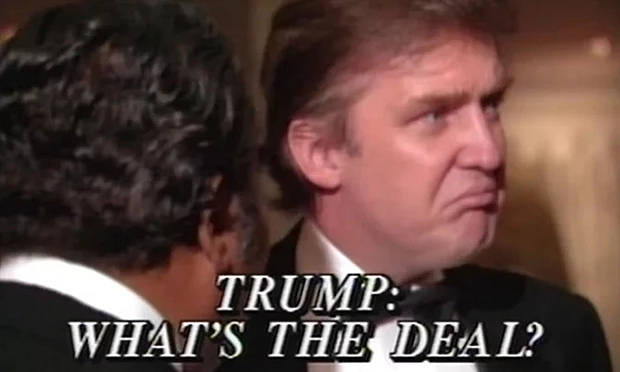Trump: What’s the deal? is a period piece produced in the late 1980s. The documentary is an unflattering look at Trump’s mafia connections and legal troubles as he rose to prominence. It was backed by Leonard Stern who owned The Village Voice and Seven Days magazine, and looking to expand into television with a series on celebrity businessmen. When Trump learned about the film, he threatened to sue anyone who broadcast or distributed it. A personal fight between Stern and Trump broke out and Stern pulled the plug. Producers Ned Schnurman and Libby Handros and director Al Levin eventually finished the film, but it was screened in public only once in 1991, and then shelved. Last summer, Libby Handros dusted it off, digitized it and uploaded it to the Internet.
The documentary, ''Trump: What's the Deal?'' was being prepared by a Manhattan production company with money from Leonard Stern, the chairman of the Hartz Mountain Corporation conglomerate and owner of The Village Voice and the magazine 7 Days. But the producers have been unable to find a syndicator to arrange for its broadcast on a New York station. Without a New York outlet, a syndicated production stands little chance of being carried in other markets.
FEBRUARY 9, 2016 | IRINA GROUSHEVAIA
THE STORY BEHIND THE SUPPRESSED TRUMP DOCUMENTARY
“If there was more critical coverage of Trump and more facts of who he really is, the less of the chance he would be running now,” Handros told WhoWhatWhy. “People need to know what the real Trump is. Old Trump and new Trump — same Trump.”
"Aside from its entertaining qualities, this documentary helps us contextualize Trump’s shenanigans and the image that he tries to control. To understand Trump at this point in his career—if you can call it that—is to understand him at a point in his life where he wants to remain relevant. During his 2016 campaign announcement, he boasted, “I’m really rich … that’s the kind of thinking you need for this country. It sounds crass; it’s not crass.”
"The film delves into his tumultuous personal affairs, stubborn business behavior and descent into bankruptcy, ending with the introduction of his Monopoly-esque board game, Trump: The Game, which parodies his attitude toward life with the motto: “It’s not whether you win or lose, but whether you win!"
"Trump: What’s the Deal? chronicles the real-estate developer and presidential hopeful’s rise to power. His self-described “addiction” to acquiring cash and real estate drove him to build developments in Manhattan, Atlantic City, Palm Beach, and Los Angeles. He skirted the law on multiple occasions throughout his career, underpaying his workers, associating with mob bosses, committing union fraud, harassing tenants, and ignoring environmental regulations, yet managed to evade legal retribution."
"Yes, Trump wasn’t, as you can imagine, thrilled at the thought of his dirty laundry being aired for all to see, reacting much the same way then as he does today—with bluster and threats of legal action. And these were techniques that carried more weight two decades ago, successfully burying the documentary by cutting off any outlet for it to be seen."
"In 1988, long before he became a reality TV star and presidential hopeful, Donald Trump was rising to fame as perhaps the most recognizable real estate developer in the country. Fellow tycoon Leonard Stern was doing a series on celebrity businessmen, and Trump was the logical first subject. But the final product hardly portrayed him positively, and so he threatened to sue any broadcaster or distributor who’d show it."
In 1988, long before he became a reality TV star and presidential hopeful, Donald Trump was rising to fame as perhaps the most recognizable real estate developer in the country. Fellow tycoon Leonard Stern was doing a series on celebrity businessmen, and Trump was the logical first subject. But the final product hardly portrayed him positively, and so he threatened to sue any broadcaster or distributor who’d show it.
"The documentary explores the notion that Trump's wealth isn't self-made or as abundant as he claims, while investigating his use of illegal immigrant labor, his connections with the mafia, his decision to hire a company that specialized in psychological attacks and his use of blackmail to move tenants out of a building."
"The film shows how greed, hubris and mistakes humbled Trump, ever so briefly, 25 years ago. It also examines his lack of real friends, and shows that both the old money crowd in Palm Beach and some of America’s leading entertainers, including Jerry Seinfeld and the late Christopher Reeve, found him oleaginous."
"Now Trump is the hottest story in American politics, and the producers think it's time for a film that reveals who he really is. As they say: "Old Trump? New Trump? Same Trump."
Get the popcorn. Pour a cold drink. And watch a movie so hot that Donald Trump did everything he could to keep you from seeing it."
"You can watch the entire film on the website Trumpthemovie.com. Of course, the Trump loyalists are already complaining about this being a smear campaign. But if you make yourself look bad, who else can you blame? Trump himself hasn’t yet addressed the movie’s return, but knowing him, he will just be excited that there is another product with his name on it."
"The footage was damning, if now obvious: According to the Huffington Post, Trump was “working with the mob in Atlantic City, intimidating tenants, hiring illegal immigrant labor, verbally assaulting his family and underlings, and trying to move a Florida airport because jets flew directly over his home.”






















